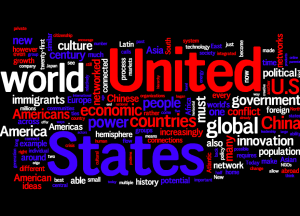“In the twenty-first century, the United States’ exceptional capacity for connection, rather than splendid isolation or hegemonic domination, will renew its power and restore its global purpose.”
This excerpt is from the Foreign Affair article America’s Edge, which has been called the “intellectual foundation” for the State Department’s 21st Century Statecraft. The piece, held by many at the State Department as its guiding philosophy, is even given to all new United States Ambassadors. However, it is important to understand how the rhetoric of 21st Century Statecraft is actually being implemented and achieved through the use of social media, “TechDels” and mobile phones.
 The State Department has equipped itself with social media tools like Twitter and Facebook to achieve this end. Two such Twitter celebrities are Alec Ross, Senior Advisor for Innovation at the State Department, with 294,646 Twitter followers, and Jared Cohen, a member of Secretary Clinton’s Policy Planning staff, with 305,440 followers. Ross and Cohen are closely associated with the Department’s modern-day diplomacy and tweet about everything from the Senate’s passing of sanctions on Iran to a Frappucino on a government trip to Syria. In all, one can find about 30 State Department staff on Twitter; these accounts have worked to bridge the gap between the public and top officials, providing access to intimate personal and political insights.
The State Department has equipped itself with social media tools like Twitter and Facebook to achieve this end. Two such Twitter celebrities are Alec Ross, Senior Advisor for Innovation at the State Department, with 294,646 Twitter followers, and Jared Cohen, a member of Secretary Clinton’s Policy Planning staff, with 305,440 followers. Ross and Cohen are closely associated with the Department’s modern-day diplomacy and tweet about everything from the Senate’s passing of sanctions on Iran to a Frappucino on a government trip to Syria. In all, one can find about 30 State Department staff on Twitter; these accounts have worked to bridge the gap between the public and top officials, providing access to intimate personal and political insights.
More unexpected world leaders are also beginning to harness the political power of Twitter. By organizing a two hundred person unit, Chavez has worked to respond to reports, complaints, and suggestions of his almost 730,000 followers. Additionally, North Korea’s government is said to behind the Twitter account Uriminzok, which has tried to dismiss accusations that North Korea was behind an attack on a South Korea warship. Everyday more and more world leaders are signing up for Twitter, with more than 35 Twitter verified world leaders ranging from Barack Obama to Queen Rania of Jordan.
However, social media is not the only technology tool being utilized by the State Department to achieve its 21st Century Statecraft. Another innovative initiative has turned to cell phone applications. Through partnerships with local African organizations, the State Department is currently conducting an Apps 4 Africa competition. The contest, which ends on August 31, will reward local developers in Kenya, Uganda, Rwanda and Tanzania who best use “digital tools to address community challenges in areas ranging from healthcare to education and government transparency to election monitoring.”
Another central pillar of 21st Century Statecraft is promoting connectedness across borders and “reaching beyond typical government-to-government interactions.” To achieve this end, the State Department has led “TechDels” to Columbia, Mexico and Syria, among other places to bring together technology entrepreneurs and experts from the U.S. with key civil society leaders abroad. These trips have included meetings with Carlos Slim, currently the wealthiest person in the world, and students at Tecnoacademia, an organization sponsored by both governments where Colombian youth can come to learn about technology and science. In addition, the State Department has also worked to bring the best and the brightest to the US. The Iraq Information Technology (IT) Intern Program brought a group of information technology professionals to study and work in the United States partnering with organizations, companies and universities like Google, Stanford, and AT&T.
Just as technology can be used for good, as the State Department has proven, through tackling issues like the earthquake in Haiti and the potential of mobile banking for the world’s unbanked, it can also be used and subjected to the opposite (internet censorship, cyberterrorism, etc.). For the moment though, this fear has been overshadowed by the State Department’s 21st Century Statecraft initiatives to “renew”, “restore” and “[re]connect” the United States.

